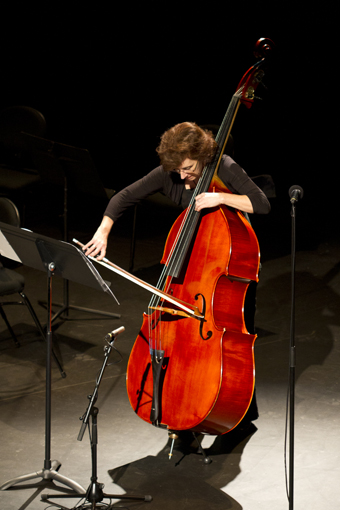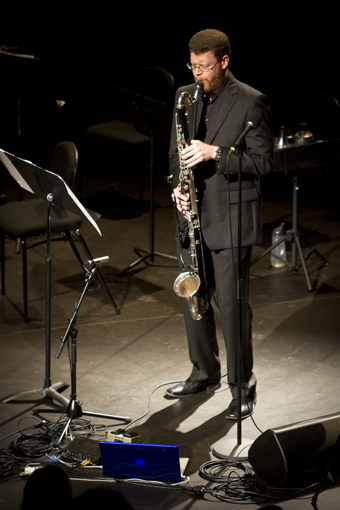movement and stasis
sam gillies: etica, twilight

Joan Wright performing Andrew Ford’s Dark Side, THNMF 2011
photo © Brad Serls
Joan Wright performing Andrew Ford’s Dark Side, THNMF 2011
SINCE ITS INCEPTION LESS THAN A YEAR AGO, THE ETICA ENSEMBLE HAS PRESENTED CONCERTS WITH AN EMPHASIS ON CONTEMPORARY CLASSICAL MUSIC FROM THE 20TH AND 21ST CENTURIES. OFFERING A PROGRAM OF SOLO AND ENSEMBLE WORKS FROM A VARIETY OF GENRES, TWILIGHT, PART OF TOTALLY HUGE NEW MUSIC FESTIVAL, PROVIDED PERHAPS ONE OF THE BEST OPPORTUNITIES TO PRESENT TO PERTH WHAT ETICA IS ALL ABOUT.
The first work for the evening was Andrew Ford’s Dark Side for solo double bass, performed by Joan Wright. Inspired by the vocal stylings of Bing Crosby, the double bass is amplified to make the intense murmuring noises of the lower register more prominent, positioning noisy string whispers against dark melodies that wind around one another. In a technically flawless performance Wright coaxed subtler nuances from the instrument and their musical implementation was interesting. However much of the piece seemed to be fairly static, always changing but not really feeling like it was developing. While the use of stasis can be a perfectly legitimate tool for musical expression, it didn’t seem to be the point of this work. Nevertheless Dark Side was a good start to the concert, engaging the audience with its emphasis on the subtle elements of the instrument.
Any momentum the concert had at this stage was swiftly halted by an overly long introduction to Charles Ives’ Piano Trio. While pianist Myron Romanu is to be commended for trying to communicate Ives’ complex musical language to the audience, his excessive detailing of each borrowed melody line and motif, and self-evident outlining of interactions between instruments made for a sluggish start. The performers themselves only really seemed to warm to the music halfway through the second movement, after which the piece really took on some life as interaction between musicians emerged. An ensemble performing the music of Charles Ives at its best captures both the distorted beauty inherent in the composer’s highly dissonant harmonies and the delightful emotional schizophrenia in his grotesque manipulations of popular and folk music. There is a strong place for Ives’ work to be performed by contemporary chamber ensembles such as Etica, but the full effect of the work can be lost when the music is only partially realised.

Philip Everall perfomring Nigel Westlake’s Onomatopeia, THNMF 2011
photo © Brad Serls
Philip Everall perfomring Nigel Westlake’s Onomatopeia, THNMF 2011
Philip Everall took to the stage next to perform Nigel Westlake’s Onomatopeia for solo bass clarinet and delay. Everall’s concise introduction and obvious enthusiasm for the work really helped to re-energise the concert. An undeniable classic of the Australian bass clarinet repertoire, Onomatopeia utilises a delay system to create thick, shimmering sheets of texture that slowly build and then evaporate. Minimalistic pulses help to drive the piece onward and give the work an involved yet accessible rhythmic character. Everall’s interplay with the electronic component was impressive, as he clearly understood how to control phrasing and dynamic elements of the music to draw out the best relationships in the sound. Minimalist music is always a crowd pleaser and Onomatopeia stood out as an obvious highlight of the evening.
Etica concluded their performance with a large ensemble work written by Perth composer James Ledger. Mean Ol’ World draws on blues motifs and attempts to transpose the form’s associations with despair and loneliness to the context of the modern chamber ensemble. Etica performed the material well, the work was sweet and accomplished and yet unchallenging.
This was always going to be a difficult performance for Etica in the context of the Totally Huge New Music Festival. The ensemble was coming off the back of three nights of inspiring concerts by Speak Percussion, Mark Gasser and Anthony Pateras that featured accomplished showcases of new Australian works as well as other challenging pieces from the 20th century. By comparison, Etica’s programming for the evening didn’t seem to have quite the same level of cultural significance. There is certainly a place, even a need, for an ensemble such as Etica in the Perth music scene, and the work they program appeals to a dedicated audience, but in the context of a Totally Huge New Music Festival, it seemed a little out of place.






